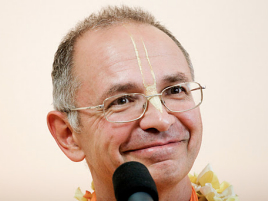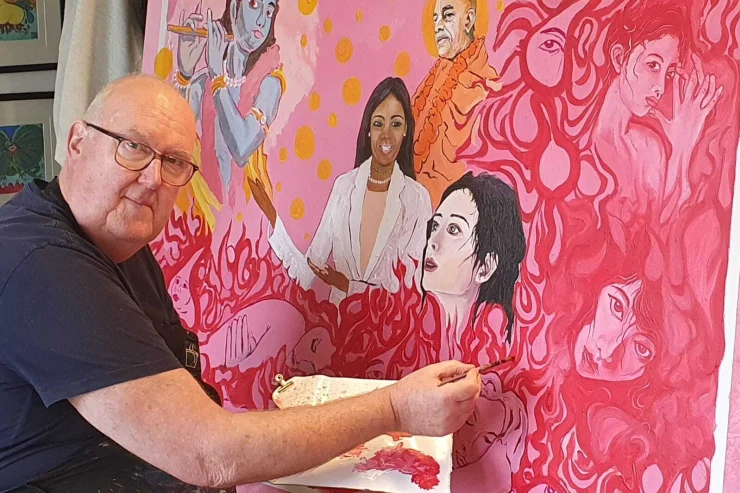An Insider Reflects on the Russian Bhagavad-gita Case
By Madhava Smullen | Apr 14, 2012

With the now-famous “Russian Bhagavad-gita case” over—at least for now—ISKCON News spoke to Bhakti Vijnana Swami, coordinator of devotees’ endeavors to protect the Gita in Russia and abroad, for some fascinating and educational reflections.
It was back on March 21st that ISKCON Russia emerged triumphant from the almost year-long court case, defending the ancient spiritual text Bhagavad-gita against prosecutors from the Siberian city of Tomsk.
The prosecutors were backed by Maxim Stepanenko, an anti-cult leader and head of the Russion Orthodox Church’s missionary department in Tomsk, who had a personal vendetta against ISKCON and wanted Srila Prabhupada’s Bhagavad-gita As It Is banned as “extremist literature.”
The case, begun in August 2011, was postponed until December 28th because federal judge Galina Butenko found the initial prosecutor’s assessment of the Gita by Tomsk University scholars to be inadequate. In December, after widespread public outrage in Russia and India, as well as a groundswell of political support from the Indian Parliament, the case against the Gita was dismissed.
Still, the Tomsk prosecutor’s office filed an appeal against the judge’s ruling. But on March 21st, 2012, the appeal was dismissed, and ISKCON and the Bhagavad-gita emerged victorious.
Bhakti Vijnana Swami says the victory was thanks to ISKCON’s lawyer Maha Balarama Dasa, spokesman Sadhupriya Dasa, and supporters in India Vrajendranandana Dasa and Gopal Krishna Goswami.
But he is especially thankful for retired prosecutor Bhakta Alexander Shakhov. “He was the most active, developing the strategy and explaining the implications, because he knows the inside track,” says the Swami of Shakhov, who was fired from his position as a prosecutor because of his involvement with ISKCON. “He dealt with the case very professionally from the beginning, and his role was indispensable.”
Reflecting on the case, Bhakti Vijnana Swami says he feels great relief, and that he has learned that when we surrender, Lord Krishna takes the reigns.
“He takes us to the point of total surrender, and then He arranges everything,” the Swami explains. “In this particular case, the situation was very desperate at one time—it really didn’t look good. But then Krishna arranged amazing things totally beyond our imagination.”
Bhakti Vijnana Swami also feels that the entire case was specifically arranged by Krishna to create awareness of the Bhagavad-gita amongst the Russian people, and to open doors that had previously been closed.
“The case definitely polarized the public to some degree, but the general response was positive,” he says. “Because we tried to act with integrity and dignity, we drew a lot of public sympathy, and won the hearts of many, who got the impression that devotees are rational and intelligent people.”
The positive response began during the case itself, starting with none other than the judge, Galina Butenko, herself. Although neutral from the beginning, with a slight lean towards the prosecutors’ side, Butenko became favorable towards the devotees after it became clear that the Tomsk University experts testifying against them hadn’t even thoroughly read the Bhagavad-gita, and didn’t want to defend their own opinion in court.
“She even studied the Bhagavad-gita!” Bhakti Vijnana Swami says. “She came to court carrying it, stuffed with bookmarks. And when the experts made a point, she would argue with them, saying things like, “You say in your expert opinion that there is such and such a statement in the book, but there is no such statement.’”
Later in the first phase of the case, Bhakti Vijnana Swami witnessed the torrent of media support both in India—where during his visit dozens of journalists called him daily—and in Russia, where over 350 different media articles covered the case, most of them favoring ISKCON.
When the appeal was filed and the second phase of the case went underway, prosecutors incited leaders of other religious denominations to cast false accusations against devotees. This propelled some to criticize ISKCON in the media, saying that they were a vicious sect and should be banned.
Mostly, however, the positivity continued.
“The most amazing thing that happened in the second round was that all the scholars, even those Indologists who had been unfavorable towards us and felt we were substandard Hindus, totally changed their opinion and started openly speaking in our favor,” says Bhakti Vijnana Swami. “They realized that what was happening was an attack on religious freedom and freedom of expression, and that devotees were actually very rational, intelligent people that they could enter into dialogue with.”
In a wonderful about-turn, Tomsk University, whose experts had spoken in court against the Bhagavad-gita, arranged a scholarly conference on the sacred book and the implications of the case; while scholars and Indologists attending the conference from Moscow made strong statements in support of the Bhagavad-gita to the Tomsk media.
Finally, on her own initiative, with no involvement from ISKCON, one very prominent scholar wrote a strong letter in defense of the Bhagavad-gita, and had it signed by ten of her esteemed colleagues.
Meanwhile Tomsk University scholar Alexei Bocharov conducted a statistical analysis of the public response to the case using comments made on various online forums. Out of 185 people surveyed, only 26 criticized ISKCON, while 159 supported the devotees’ case in some way. Of these, 42 ridiculed the absurdity of the case against the Bhagavad-gita; 90 were well-wishers of ISKCON who were strongly against the prosectors’ narrow-mindedness; and 27 gave a general criticism of Russia’s ‘extremist’ law, which had been applied to the Gita.
“From a sociological perspective, this case clearly taught one very important lesson to the whole of ISKCON,” Bhakti Vijnana Swami says. “That people in general nowadays are inclined to be sympathetic towards spiritual organizations and religions, but that they hate fanaticism and narrow-mindedness. If we want to win the hearts of people, we have to present the broad-minded perspective of the Vedic approach—without compromising our specific path, of course. It’s because we behaved from this vantage point, trying to be open and broad-minded, and our opponents showed a completely different approach, that we ultimately won the public’s sympathy.”
Unfortunately, while most devotees acted in a cultured way, some devotees, particularly on the Internet, responded during the difficult times in the case—and even more so upon achieving victory—with insecurity, aggressiveness, vengefulness and fanatacism.
“That was our greatest enemy on the inside,” says Bhakti Vijnana Swami, who feels the reaction is something we can learn from as a society. “I focused on cooling down the devotees and telling them to behave in a mature way. As Krishna teaches in the Bhagavad-gita itself, a devotee does not become desperate when there is defeat, or overjoyed when there is a victory, but is equipoised and level-headed in all situations.”
Another lesson learned in the Bhagavad-gita case was that creating an uproar is not necessarily always the best course of action.
“When I saw all the agitation in India over the case, I was a little apprehensive,” Bhakti Vijnana Swami says. “We had to be very careful, because as Mr. Ajay Malhotra, Indian Ambassador to Russia, explained to us, too much public awareness could actually negatively affect our case. The courts in Russia are independent, and too much media noise—especially foreign media—can be an intrusion into the legal procedure. Also, different nations—in this case Russia and India—have their own etiquette in dealing with each other, and too much pressure can ultimately be unhelpful.”
Of course, the agitation in India also had its positive side. When Russian anti-cult sources propagated the misinformation that ISKCON is obscure and not recognized in India, the uproar in that country showed the real picture: that ISKCON is very much mainstream in India, and enjoys public and governmental support. Even the President of India, Srimati Pratibha Patil, stepped into the picture, most recently stating in a letter to ISKCON, “I wish success to Bhagavad-gita As It Is. It’s a noble message, and I congratulate ISKCON for distributing Bhagavad-gita As It Is by A.C. Bhaktivedanta Swami Prabhupada.”
So what’s next for the Bhagavad-gita in Russia? Bhakti Vijnana Swami says that the prosecutors may attempt to file another appeal within the next two weeks to the regional high court in Tomsk, and that the Supreme Court would be the next step after that. But he’s not worried.
“In the next stage, no new material is accepted—the case can only be reversed if there were some prior procedural flaws,” he explains. “But our legal procedure was impeccable, so our lawyers think its unlikely the prosecutors will take the case any further; and if they do, they have very little chance of winning. Moreover, if they get to the Supreme Court—which is even more unlikely—they have no chance whatsoever. Because the Supreme Court is in Moscow, where the procedure is much more open and fair, and their bizarre case wouldn’t hold.”
With victory almost certain, the Russian devotees are putting the Bhagavad-gita case behind them and looking forward to their future: construction on the mega Vedic Cultural Center and Sri Sri Radha Madhava Temple project on the outskirts of Moscow is set to to begin in August this year.
Meanwhile, Bhakti Vijnana Swami expects attacks of different forms to continue from people and organizations inimical to ISKCON. “But,” he says, “As the famous statement from the Upanishads goes, ‘Satyam eva Jayate’: the truth will prevail.”
Please visit http://veda.ru/en/ to find out more about the Moscow temple, and to donate towards the project.















